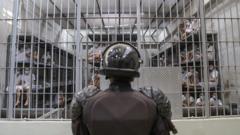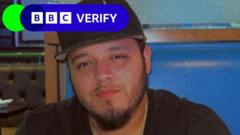Maryland Senator Chris Van Hollen has called attention to the troubling case of Kilmar Ábrego García, who was wrongly deported to El Salvador and placed in a problematic prison, sparking ongoing debates regarding immigration policy and the legal system.
US Senator Advocates for Deported Maryland Man Amid Controversy

US Senator Advocates for Deported Maryland Man Amid Controversy
Senator Chris Van Hollen speaks out after visiting Kilmar Ábrego García, who was mistakenly deported by the Trump administration to El Salvador.
Senator Chris Van Hollen has returned from El Salvador, raising concerns about the treatment of Kilmar Ábrego García, a Maryland resident mistakenly deported by the Trump administration. Van Hollen revealed that after being detained in the notorious mega-jail, Cecot, Mr. Ábrego García was transferred to a different prison in Santa Ana, where conditions were reportedly better.
Upon meeting García, Van Hollen described him as "traumatised" and fearful during his initial incarceration, with the senator emphasizing that the detainee had not committed any crimes. The Supreme Court has mandated that the government facilitate García's return to the U.S.; however, the Trump administration has resisted these orders, insisting on his ties to the gang MS-13, which he and his family vehemently deny.
Despite not having any criminal convictions and arguments from his attorneys regarding the allegations, the administration continues to maintain a hardline stance against his return. Van Hollen has criticized the government's refusal to present evidence in court, asserting the need for legal processes instead of public denunciations via social media.
Ábrego García's journey took a troubling turn when he was arrested in Baltimore on March 12 and subsequently deported to El Salvador on March 15, leading to a contentious battle in immigration courts over his future and rights.
In an intricate web of judicial oversight and executive authority, the case embodies the deepening conflict regarding immigration within the U.S. legal system and the executive branch's interpretation of the laws surrounding alleged gang affiliation.
This situation continues to unfold, raising critical questions about the treatment of deportees and the implications of U.S. immigration policy. As the legal battle progresses, the outcome remains uncertain.
Upon meeting García, Van Hollen described him as "traumatised" and fearful during his initial incarceration, with the senator emphasizing that the detainee had not committed any crimes. The Supreme Court has mandated that the government facilitate García's return to the U.S.; however, the Trump administration has resisted these orders, insisting on his ties to the gang MS-13, which he and his family vehemently deny.
Despite not having any criminal convictions and arguments from his attorneys regarding the allegations, the administration continues to maintain a hardline stance against his return. Van Hollen has criticized the government's refusal to present evidence in court, asserting the need for legal processes instead of public denunciations via social media.
Ábrego García's journey took a troubling turn when he was arrested in Baltimore on March 12 and subsequently deported to El Salvador on March 15, leading to a contentious battle in immigration courts over his future and rights.
In an intricate web of judicial oversight and executive authority, the case embodies the deepening conflict regarding immigration within the U.S. legal system and the executive branch's interpretation of the laws surrounding alleged gang affiliation.
This situation continues to unfold, raising critical questions about the treatment of deportees and the implications of U.S. immigration policy. As the legal battle progresses, the outcome remains uncertain.



















